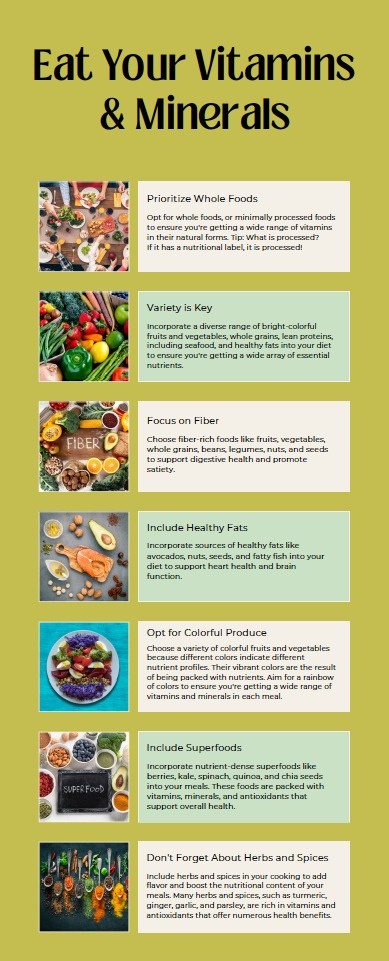


Boost Your Nutrients: Let's Begin!
20+ Tips on How to Eat Your Vitamins & Minerals
Get Your Free Guide
Today!
- Tips How to Eat your Vitamins & Minerals
- 6 Essential Nutrients
- 8 Nutritional Tips
No Credit Card Required

Key Benefits
The Power of Whole Foods for Optimal Nutrient Absorption, Energy, Gut Health, Immunity, Weight Management, & Glowing Skin!
Optimized Nutrient Uptake: Nutrient-dense whole foods provide a wide array of essential vitamins, minerals, and antioxidants, facilitating optimal absorption and utilization by the body, promoting overall health and vitality.
Sustained Energy Levels: Whole foods contain complex carbohydrates, healthy fats, and proteins, offering a balanced source of energy that supports stable blood sugar levels, sustained energy throughout the day, and improved physical and mental performance.
Improved Gut Health: Whole foods are rich in dietary fiber, promoting digestive regularity, supporting gut health, and reducing the risk of digestive disorders such as constipation, bloating, and irritable bowel syndrome (IBS).
Enhanced Immune Function: Nutrient-dense whole foods contain essential nutrients such as vitamins C, D, and zinc, along with antioxidants, which strengthen the immune system, reduce inflammation, and protect against infections and chronic diseases.
Weight Management: Whole foods aid in weight management by offering fewer calories and more fiber than processed alternatives, fostering satiety, and curbing cravings. Nutrient-rich whole foods bolster metabolic health and potentially mitigate the risk of obesity-related ailments.
Improved Skin Health: Whole foods rich in vitamins, minerals, and antioxidants contribute to radiant skin by promoting collagen production, reducing inflammation, and protecting against oxidative damage, resulting in a healthier and more youthful complexion.

Hello!
I'm Maggie with
Nutrition.Nutrición, LLC
As a Nutrition Coach, I've developed a deep understanding of the crucial role nutrition plays in our well-being. Grounded in my passion for whole foods and a fascination with nutritional science, my perspective has been enriched by travels across 29 countries, reinforcing my dedication to nourishing foods.
With a minor in Nutrition and a certification in Healthy Eating from Harvard University, complemented by ongoing studies in Food Science, I am committed to sharing insights derived from both academic knowledge and personal experience. Our approach emphasizes obtaining vitamins and minerals from whole foods rather than supplements, enabling individuals to harness the full spectrum of health benefits.
Curious about our philosophy? Dive into our free downloadable Infographic on 'Tips on How to Eat Your Vitamins & Minerals,' offering practical guidance for optimizing your nutrition naturally. Stay informed by joining our mailing list for updates on our newsletter, featuring easy-to-follow recipes packed with nutritional value (enjoy a bonus recipe below!).
Are you ready to take charge of your health journey and unlock a happier, healthier you? Download this free resource today to kickstart your path toward vitality and wellness!
Kale Smoothie
Ingredients:
2 kale leaves
1/2 banana
1/2 of an apple
1 tablespoon of chia seeds
Handful of walnuts
1 cup of water
Total Vitamins & Minerals: A, C, K, B6, E, folate, potassium, magnesium, calcium, phosphorus, manganese, copper, omega-3 fatty acids, fiber, protein, and iron.
Directions:
Place all ingredients in a blender.
Blend on high speed until smooth and creamy, adding ice cubes if desired for a colder smoothie.
Nutritional Tip: Avoid discarding strawberry tops (greens); they're packed with nutrients that can enhance any smoothie, including vitamin C, vitamin K, folate, potassium, and fiber. They can also be frozen for later use.
Serving Size: 1
gr
een
smoothie